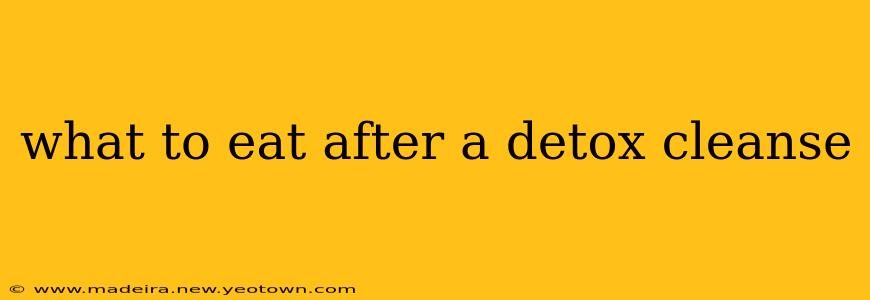What to Eat After a Detox Cleanse: A Gentle Reintroduction to Nourishing Foods
So, you’ve completed your detox cleanse. Congratulations! You’ve likely spent days or weeks focusing on specific foods and drinks, aiming to rid your body of toxins and reset your system. Now comes the crucial next step: reintroducing food in a way that supports your body's renewed state and avoids undoing all your hard work. This isn't about immediately diving back into your old eating habits; it's about a gradual and mindful reintegration of nutritious foods.
Think of your digestive system like a delicate ecosystem. The cleanse may have shifted its balance, so a sudden influx of processed foods or rich meals could cause digestive upset, bloating, or even fatigue – precisely what you were trying to avoid!
This is where a strategic approach comes in. We'll explore the best foods to eat after a detox cleanse and address common questions.
What foods should I avoid immediately after a detox cleanse?
This is a crucial question, as many people make the mistake of immediately reverting to their previous diet. Avoid processed foods, refined sugars, excessive caffeine, and alcohol for at least a few days, and preferably longer. These can overstimulate your digestive system and counteract the benefits of the cleanse. Similarly, limit red meat and dairy initially, as they can be harder to digest.
What are the best foods to eat after a detox cleanse?
The key is to start with easily digestible, nutrient-rich foods that gently support your gut and provide your body with the building blocks it needs to thrive.
-
Hydration is Key: Continue drinking plenty of water, herbal teas, and fresh juices. Hydration is fundamental to detoxification processes, and it helps flush out any remaining toxins.
-
Fruits and Vegetables: Begin with easily digestible fruits like bananas, applesauce, or melon. Steamed or lightly cooked vegetables are also excellent options. Focus on colorful produce to ensure a wide range of vitamins and minerals.
-
Whole Grains: Introduce whole grains gradually, opting for options like oatmeal, quinoa, or brown rice. These provide fiber, which supports healthy digestion.
-
Lean Protein: After a day or two, introduce lean protein sources like fish, chicken breast, or lentils. These provide essential amino acids for repair and rebuilding.
-
Healthy Fats: Incorporate healthy fats such as avocado, nuts (in moderation), and seeds. These fats support hormone production and overall well-being.
How long should I wait before eating "normal" food?
There's no one-size-fits-all answer. It depends on the intensity and length of your cleanse and your individual response. It’s generally advisable to stick to the gentler foods for at least 2-3 days post-cleanse. Listen to your body; if you experience any digestive discomfort, slow down the reintroduction process even further. Gradually reintroduce "normal" foods over a week or two.
What if I feel bloated or experience digestive issues after the cleanse?
Bloating and digestive issues can occur as your gut microbiota adjusts after the cleanse. If these symptoms persist, consider incorporating probiotics (through yogurt or supplements) to support gut health. If symptoms are severe or persistent, it is always best to consult a healthcare professional.
What are the long-term benefits of eating a healthy diet after a detox cleanse?
The goal of a detox cleanse isn't just about short-term results; it's about establishing long-term healthy eating habits. Maintaining a balanced diet rich in fruits, vegetables, whole grains, and lean proteins will contribute to sustainable weight management, improved energy levels, better digestion, and a stronger immune system. The cleanse is just a jump-start to a healthier lifestyle.
Remember, the success of your detox cleanse depends not only on the cleanse itself, but also on your post-cleanse eating habits. Make the transition gradual, listen to your body, and prioritize whole, unprocessed foods for lasting well-being. You’ve made a significant commitment to your health; nourish your body accordingly.

